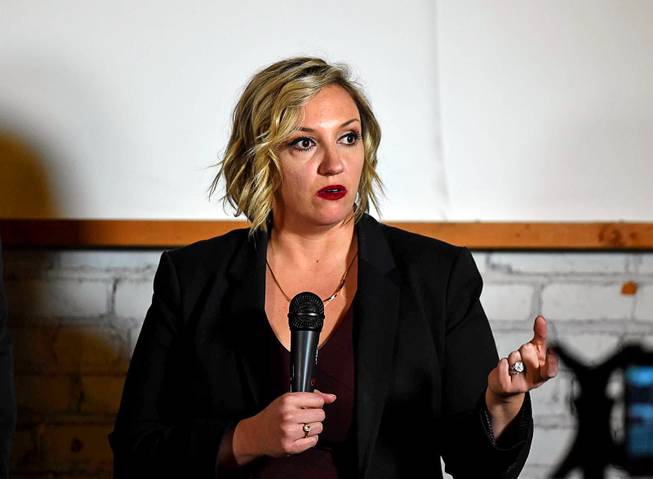
Andy Barron / Reno Gazette-Journal
Nevada Senate Majority Leader Nicole Cannizzaro speaks at Pints and Politics, a monthly event hosted by the Reno Gazette-Journal for community members to interact with state elected officials.
Tuesday, May 4, 2021 | 9 p.m.
CARSON CITY — Christin Saunders’ wedding day was the day after her 26th birthday, the day she was kicked off her parents’ insurance.
Though she had been in a relationship with her now-spouse for years, they needed to schedule a wedding quickly so she wouldn’t be uninsured.
Saunders, the executive director of the Progressive Leadership Alliance of Nevada, shared her story during the first committee hearing on Senate Bill 420, which would create a public health care option in Nevada.
“A policy like a Nevada public option would have made a huge difference when I was struggling to ensure I was still going to be able to access my medical care for my chronic illnesses and the prescriptions I take every day,” Saunders said.
The bill, sponsored by many state Democrats and led by Senate Majority Leader Nicole Cannizzaro, D-Las Vegas, would make the plan, called the Nevada Option, available through the state’s insurance marketplace and state-contracted health insurers. Under a proposed amendment for the bill, coverage would begin by 2026.
In opening comments Tuesday afternoon, Cannizzaro spoke about her experience growing up in a working-class house, stressing she was lucky to have parents who qualified for a good health insurance plan.
“When we were sick, we got to go to the doctor and for the longest period of my life, until I became an adult, I thought the doctor was $20 because that was what we paid,” she said.
In college, she said, she injured herself badly and had no insurance. She couldn’t pay off the bill for years.
Even with the federal Affordable Care Act, popularly known as “Obamacare,” around 350,000 Nevadans remain without insurance. Senate Democrats have said the Nevada Option would be available to 67% of uninsured Nevadans.
The bill would require companies that bid to provide Medicaid services in Nevada to also offer plans under the public option. Cannizzaro and proponents have argued the measure is a way to leverage the state’s $2 billion in Medicaid contracts to expand affordable health care.
These options could not increase any year by a greater amount than the Medicare Economic Index, a measure meant to provide a floor for prices but that some have concerns with. Premiums for the public option would also be 5% lower than a ZIP code’s reference premium.
Jaron Hildebrand, the executive director of the Nevada State Medical Association, expressed concern that the price floor being set at the Medicare rate would essentially cap the plans at that cost. That would lead to less reimbursement for doctors in many cases.
“Simply, Medicare rates have not covered the costs of providing care in the public market,” Hildebrand said.
Some hospital and insurance groups have argued the change would create an undue financial burden on providers and the insured. A public option, some like the Henderson Chamber of Commerce argue, could increase costs on people insured under their employer.
Jim Wadhams, a lobbyist for the Nevada Hospital Association, said the group supports a public option but has issues with the bill. He said a study needs to be done on the people who would be targeted for enrollment on the bill.
Wadhams shared Hildebrand’s concerns that the bill could lead to less reimbursement for doctors in some cases.
Organizations including Battle Born Progress, the Nevada Public Health Organization, the Nevada State Education Association and PLAN supported the measure.
The bill also received support from the politically powerful Culinary Workers Union Local 226 after an amendment was proposed that would allow the union to offer its health care plan on the exchange. The state would have to seek a waiver for the bill to do this.
The bill did not receive a vote on Tuesday and has not been immediately scheduled for another hearing. Although lawmakers are facing another deadline on May 14, and the rapidly approaching end of the session, the bill was made exempt by its late introduction.
